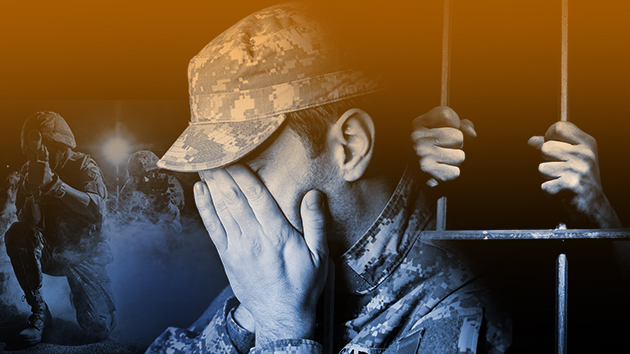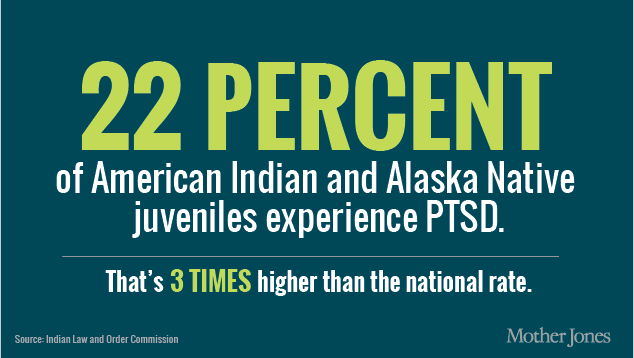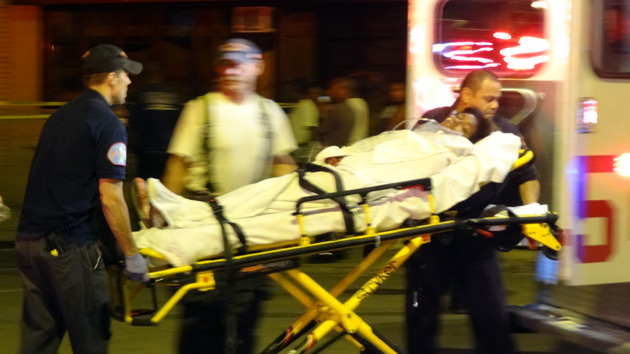As millions of Americans around the country fire up the grills on Memorial Day and welcome the arrival of summer, it might be easy to forget what the holiday is supposed to commemorate. That’s why on Monday, the POV (Point of View) series on PBS will air Of Men and War, a documentary years in the making that chronicles the stories of American combat veterans as they undergo therapy to cope with their traumatic memories of war.
French filmmaker and producer Laurent Bécue-Renard spent 10 years working on the project, conceptualizing it, scouting locations, finding veterans who would be willing to participate, and then filming their therapy sessions. He focused much of the film on the Pathway Home, a therapy and service center for veterans in Northern California that offers an immersive residential treatment setting for veterans. Bécue-Renard and his cinematographer spent 14 months filming therapy sessions and then checked in on the veterans over the course of four years, filming their family lives after treatment.
“Rage and anger carried me through everything,” one veteran says as the cameras roll. Another describes killing somebody. “I leveled my weapon, led my target, and I pulled the trigger,” he says, adding that while subsequently moving the body, “a big chunk of his brain fell on my foot.” As he starts to tear up, he describes the blank stare on the corpse’s face. “He just kept looking at me.”
The film originally debuted at the Cannes Film Festival in 2014 and went on to win the award for best feature-length documentary at the International Documentary Film Festival in Amsterdam later that year. Monday’s airing is the US television debut. Bécue-Renard’s first war documentary, War Wearied, was released in 2003 and chronicled the lives of three war widows in Bosnia. Of Men and War is the second film in this trilogy; the third will focus on the children of veterans and how their parents’ military service shapes their lives.
Bécue-Renard spoke with Mother Jones about the process of making the film, how it affected him, and what he thinks people should take away from it.
Mother Jones: This film deals with some pretty heavy stuff. How did the material affect you?
Laurent Bécue-Renard: I had a specific quest while doing this project. Both my grandfathers fought in World War I, but they never spoke [about it] to their wives, nor to their kids, or to their grandkids. So I always felt that there was something that wasn’t being told in the family and that I definitely wanted to access. I also have my own experience of war as a civilian, since I spent the last year of the war in Bosnia [as] the editor of an online magazine. That experience determined my career as a filmmaker, and I first made a film called War Wearied, where the question of being a war widow was addressed. After that film, I really felt the need to have access to what it is to be a young man sent to war, survive it, come back home, and start a family, or live with a family, and raise kids.
I was ready to hear what I was going to hear while I would be shooting. Besides that, for three years before starting to shoot, I did extended scouting, mostly in California, with combat veterans and their families and therapists. All that I heard, including what I heard afterward while shooting, sounded very familiar. It’s not only about death, it’s about surviving. The film itself is a journey toward life, which makes it a rather positive outcome. Although it’s tough. There are a lot of difficulties for each of these young men to survive. On the daily basis when you’re sitting in the therapy room, it’s mostly about death.
So I won’t be hiding that. At times it was tough to hear, because when you’re in the editing room for four years, you keep hearing it, day after day after day after day, and we had so much material, 500 hours to edit, so it takes a toll on you, of course. But again, I had a quest, and also, as the therapist is doing in the therapy room, I was seeking [to show their quest to regain] life. And that also helped not only me, but also my editors and my cinematographer.
MJ: Less than 10 percent of the US population has served in the military. What do you want Americans to take away from this film?
LBR: There’s a huge amount of young men and women deployed to either Iraq or Afghanistan that are paying a high price, and this is the real cost of the war. It can’t be only when we talk “this war” or “that war,” or “going to war there or there,” and we are in favor or we are against. It can’t be only a discussion over the idea or the concept or the politics of the war. It has always to bear in mind the high price that will be paid by these young men and women and their families. That’s one thing.
The second thing is, you’re right, people have no idea, consciously they have no idea. But all our families in the Western world have gone through two world wars in the course of the 20th century and subsequent wars in the post-colonial world. You’re talking about the US—all families were touched one way or another by World War II. So what these guys are saying, and what I was saying earlier about my grandfathers, it’s something that did touch their family at one stage or another, and it did shape the psyche of the family in one way or another.
I’m always amazed in America, when I write the subject and say it’s not really about now—of course it’s about now because I shot now—but it’s also about your father or your grandfather or your great grandfather. And you know, they would have said most probably the same thing as these men in the therapy room had they been in a position to talk about their experience, to talk about what they felt and how war affected them.
MJ: You point out the generational aspect of this, and it’s certainly apparent in the film. Why are generations so important in this story of war?
LBR: In the film you see a few kids who are growing up next to their father, who has been traumatized by the experience of war. And these kids that we see on screen, to some extent it is us, or it is our parents, who grew up next to a father or a grandfather that was strongly affected by the experience of war.
So it’s not that far away. You just need to think a little bit. If we, the democracies, go to war, of course it’s always a failure because we didn’t manage to solve our problem through diplomacy or politics or economics or culture or whatever. But there’s a high price that will be paid by a few young men and women, and we should always have that in mind.
It is already in our family. We might not know it consciously, but it’s there. It’s been experienced in the past and it has shaped our families.
I’m deeply convinced that most modern neuroses find their roots in the experience of war in the previous generation in the 20th century, and sometimes we don’t know why we have that kind of neurosis in our behavior, and in one way or another there’s a link to some extent with the experience of the war.
MJ: There has been a lot of PTSD coverage in the US in various mediums. What makes this film different?
LBR: The camera is, from scratch, embedded in the therapy process. And it’s part of the therapy process. Meaning that you, the viewer, you’re part of it. And you’re in this room from the very beginning of this journey that each of these guys is going through in therapy, and they want you to be there; otherwise they would not accept the camera. It is, for them, very important to be acknowledged, and that their trauma and their experience be validated by not only the community they belong to, but the community of mankind that they feel separated from because of their experience with war. I know a lot of programs have addressed the question of…what is PTSD, what are the consequences of PTSD? But here you’re part of the process.
MJ: It seems as if the role of narrative in all this is really important.
LBR: Part of the trauma and part of the consequences of the trauma is that they feel so lonely. Not only within the family, but within the community. The premise of the film is also that this story they’re working on and their work as a patient in therapy is something that is going to be shared. The process itself, not only the story, but the process of how difficult it is to find a way to tell a meaningful story about what happened to you in the context of the war. That’s what you’re witnessing on screen.
It’s not a depressing process. This is the difference between just interviewing people with trauma. Here they are in a survival process. They want to survive, they want to live. So what you’re witnessing is their fight for survival, even though it’s tough, and things you’re going to be hearing are tough things. Even though these guys went through very, very difficult things, they’re fighting to survive psychologically. And that’s what you’re witnessing, and you’re part of their survival journey.
MJ: What do you think about the Memorial Day timing of your film’s first screening in the United States?
LBR: I’m very happy and honored that POV and PBS chose Memorial Day to broadcast the film. It’s not only about the Afghanistan or the Iraq war. It’s about all the men and women who went to war and experienced it and were traumatized by it and survived it and lived with the experience of the war. I think if people can bear that in mind, always, it will help them, even in their daily life. That’s where we come from. At one stage or another we have to face it, and it’s better than avoiding it.
I’m also very happy for the characters in the film, because for them it was not only a courageous journey to go through therapy. Very few men and women go to such a residential therapy program during which, for three to four months on average, you go to sessions and you’re really working hard on your psychological wounds. It’s a very courageous journey—but it’s all the more courageous to do it and publicly accept the camera in the room and to stick to it. They never asked us to leave the room or stop filming. They really wanted it and they did it very courageously.
And when they eventually saw the finished film, they realized and they told us how important it was for them. They realized that the film was giving a voice not only for them, but for all the guys and women who would never go to therapy or would never be heard by not only their families, but the community. So I’m so proud that it’s broadcast on Memorial Day.















